




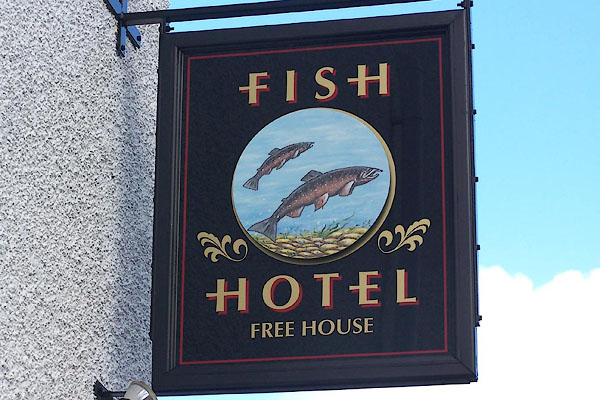
BNB99.jpg Innsign, trout.
(taken 11.12.2006)
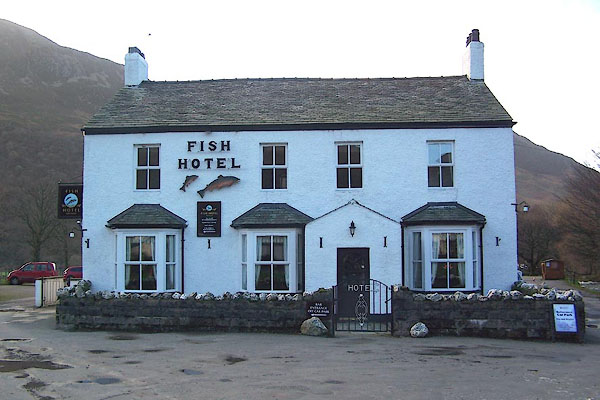
BNB97.jpg (taken 11.12.2006)
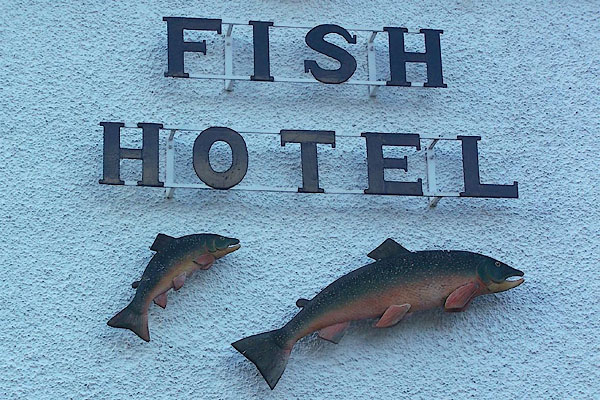
BNB98.jpg Innsign, trout.
(taken 11.12.2006)
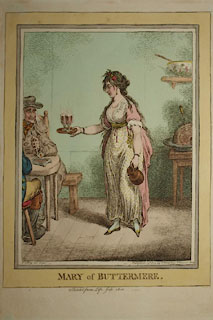 click to enlarge
click to enlargeBSF68.jpg
"Her face was a fine oval, with full eyes and lips as red as vermillion. Her cheeks had more of the lily than the rose ..."
courtesy of the Wordsworth Trust
placename:- Inn, The
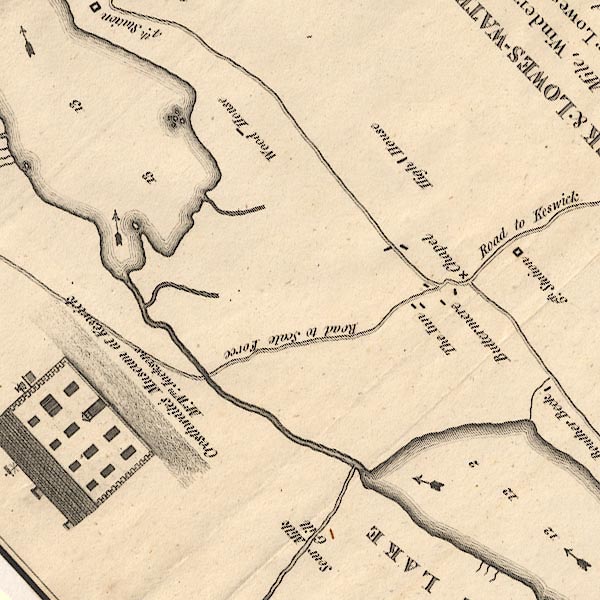
CT8NY11T.jpg
"The Inn"
In Buttermere.
item:- Armitt Library : 1959.191.2
Image © see bottom of page
item:- dance; Mary of Buttermere
 goto source
goto sourceGentleman's Magazine 1800 p.21 "..."
"I was all hurry to reach the village of Buttermere, and made up to the public-house, in which I was received by the chief object of this Ramble; and was given to understand I might have a bed, but should be much disturbed, as they were going to have an annual dance, for the benefit of one Askew, a blind fiddler of Whitehaven."
"Nothing could more delight me than this information, because, amidst the life and unaffected mazes of a rustic dance, an observer can look deeply into the hearts of the happy throng."
"This Askew, bye the bye, is not only a great favourite with the Cumberland lads and lasses, but has much more musical skill than inspires the itinerants of his profession; and much more humour in playing, than many who have the advantage of eyes to lead them by. ... he can find his way every where; and can actually go (where there are paths) over these tremendous mountains unattended. "His staff," he says, is "his friend, and his God his guide." I found him at dinner, having just arrived; and I mellowed his meat with some sound beer. I was no sooner seated in a two-armed chair, but the daughter of the house, seeing the dirty condition of my legs, brought me ere I asked some warm water, and her old father's shoes and stockings: ..."
item:- Sally of Buttermere
 goto source
goto sourceGentleman's Magazine 1800 p.22 "..."
"This Mary is the young person described five years and a half ago; under the character of"
""SALLY OF BUTTERMERE.""
"My dinner, being cold corned surloin of most marbled beef, was soon ready, and fire in a small room prepared for me. I was waited upon by Mary, and contrived to joke away famously, and the dirtiness of the walls, gave me a fine opportunity; for I observed writing in Greek, in Latin, in French, and English, upon them; all about her, and which I gave her to understand were the probable reasons of the walls not having lately been white-washed. Her denial too much crimsoned her face, for me to believe her; and the next morning I saw the compliments in English were rubbed out."
"Here is a noble field of thought! which, if the reader understandeth, will rejoice him - and if he does not - it matters not. Mary's hair, so ornamental when we before saw her was folded under her cap; she went out to prepare for the dance; on my calling suddenly, she instantly came in; her hair was down her back rather darker coloured, remarkable thick, and near a yard long: and I regretted it was going to be concealed under a cap. The blind man had expressed himself so well, I wished to hear more, and ordered a pipe to my first seat in the chimney-corner; not doubting but I should pass very well, both by my dress and talk, for a farmer."
"About 7 o'clock, a well-dressed young man, full 6 feet high, rosy as the morning, with fine black eyes and hair, of a sweet countenance, was the first person that came in; and I drew him into conversation. From this youth's early arrival, and from the modesty of his speech, I could not help wishing, and even thinking, that he was Mary's favourite; and I determined to observe accordingly. At eight, I heard a distant burst of laughs, and, guessing the casue, ordered Askew to play, as quick as possible, "Come haste to this wedding;" and a rare parcel of lads and lasses rushed in. I guessed this music would hinder them from immediately eyeing the stranger; for I knew every body in these sequestered valleys are the most inquisitive and observing in the world; besides, I half buried myself in a cloud of smoke. Some of them stopped to tap Askew on the back; some shook the old woman of the house by the hand, and some peer'd through the cloudy atmosphere at my phiz. - All this was done in a minute, when up stairs they clattered, and a reel commenced."
"There was not one of them but curiosity soon brought down to have a peep at me; and I had, I was pleased to see, a few courteous looks from some pretty girls. I had smoked the little all of tobacco in the house, and now felt myself sufficiently acquainted to go amongst them. - They were the very rosiest-cheeked mortals I ever saw; - the men kept excellent time, and rattled on the floor with a variety of stops (sic); the women danced as easily as the men determinedly. The dance was never long, and the moment the fidler ceased another set that were ready called a fresh tune, and began. I was glad to notice the black-eyed youth hand out Mary and another young girl, and call for a reel; and, I honestly say, I never saw more graceful dancing, or a woman of finer figure to set it off, than in Mary of Buttermere. I was delighted that this exhibition lasted three times longer than any former one. The fidler knew how well she danced; indeed he had told me, and said, "she shall set herself off before you." At the conclusion, the youth turned round to Mary, and most respectfully bent one knee, then led her, I thought, not unwillingly to her seat. Here was a field for a rural observer."
"I now went down stairs, and had the pleasure to hear my health drunk. Some of them, understand-"
 goto source
goto sourceGentleman's Magazine 1800 p.23 "[understand]ing there was not any more tobacco to be procured, came and opened all their little papers in the dish; and they agreed, that "I was yan of the cheariest streangers they had e'er seen he Buttermere:" such like expressions were sure to enliven, and I was by this too much a part of this happy group, to continue at my pipe; however, I just took some more whiffs, to let them see I did not refuse their ready gifts."
"A stout man, more than six foot, belonging to Lorton, about this time entered, and most piteously regretted he had not known of the dance, as his iron-bound clogs were too heavy to dance in: mine being by this time dry, I offered to lend them for the night; but he had the disappointment to find them too short, or, he said, "they would ha done very weel;" though by the bye they weighed 2lbs 7 ounces. - However, he soon was amongst the dancers, and footed it away in his stocking-feet; and after they were worn out, barefooted."
"At eleven, the females all came down stairs, and the old mother waited upon me at their desire, "to request I would go into the parlour, and partake of a Christian custom." A large bowl was upon a dish full of what they called "Pouseoudi," or an ale-posset, with some rum and plenty of nutmeg, sugar, and bread. Spoons garnished the dish, and every body was to take one: upon the women finding there was a spoon wanting (as I of course let them help themselves), they one and all offered me theirs, and Mary flew out of the room and brought in another. We then, on a kind of signal, began; and most excellent and stomach-warming it was: when we had finished about three-quarters of the bowl, some one recommended that we should leave the rest for the old mother, because she had made it so good; instantly every spoon was on the dish; and I am not ceratin, whether this natural civility both to me and to the old woman did not warm my heart more than the good posset."
"While thus feasting, the men were not idle; and all manner of sounding steps, from the shuffle of pumps to the force of iron-clad shoes, were labouring over our heads, with the variety of sound attributed to a Dutch concert."
"Several times, when Mary and her female friend came down to have their own talk, the black-eyed swain was in her wake, but did not follow them into the parlour; once indeed I persuaded him to come in, but they joked him out again; and, by finding myself sufficiently intimate to have my joke too, I took his part, and learnt - "We make nothing of him, he's only a next-door neighbour, - that's all." I shrewdly guessed he was next neighbour to the heart; but was rather more certain that Mary was in his. I told them, I had somewhere read of a "Sally of Buttermere," and asked which was her? The friend replied, "My name is Sally; but this Mary here is the Sally the South-countryman wrote about, and I love her above all the world." Some of the lads were getting mellow and noisy; and I had in consequence a famous share of chat with the fair two; whom I could not avoid giving a decided preference over many other buxom lasses."
"Mary Robinson has really a heavenly countenance, yet is she far from a perfect beauty; and in a few years she may even grow too large ever to have been thought what she now is. She is nineteen, and very tall; her voice is sweetly modulated; and in every point of manners she appeared such as might be fitted"
""Or, to shine in Courts with unaffected ease," &c."
"On speaking about her hair, her friend immediatley unpinned her cap, and let it afloat; and, at my request, that natural ornament was left to flow."
"It was pleasant to see all the"
 goto source
goto sourceGentleman's Magazine 1800 p.24 "women well and plainly dressed in neat check-aprons, a useful and becoming part of rural dress; nevertheless we had a fine glare of ribbons."
"About two, the party went, as they had come, all together. A homely bed served me as well as a bed of down could have done; for the hurry both of body and mind, in so interesting a day, chased away sleep; yet I had a sufficiency to be refreshed. In the morning, our heroine was in her working dress; and she exhibited just enough of hair, to convince me that she had taken my hint properly."
"The weather was louring; and I did not wish, in case of a downfall, to be entombed in Buttermere; therefore, taking the opportunity of being alone, I told her I knew the author of a Fortnight's Ramble, and as such had something to say to her; she curtsied respectfully; and taking her by the hand I began:"
""Mary, I wrote it, and rejoice in having had such an opportunity of minutely observing the propriety of your behavious. You may remember, I advised you in that Book never to leave your native valley. Your age and situation require the utmost care. Strangers will come, and have come, purposely to see you; and some of them with very bad intentions. We hope you will never suffer from them; but never cease to be upon your guard. You really are not so handsome as you promised to be; and I have long wished, by conversation like this, to do away with what mischief the flattering character I gave of you may expose you to. Be merry and wise.""
"She told me, she sincerely thanked me, and said, "I hope, Sir, I ever have, and trust I always shall take care of myself.""
"I then gave her a a hearty salute; bade her farewell! and, teeming with good wishes towards my felow mortals, toiled out of the Valley of Buttermere."
"A RAMBLER."
 goto source
goto sourcePage 23:- "... There is a comfortable inn at Buttermere, between the two lakes, and another at Scale Hill on the foot of Crummock; at one of which places a boat is usually taken, as well for a survey of the scenery, as being the most convenient way of seeing the noted waterfall of Scale Force, on the opposite side of the lake."
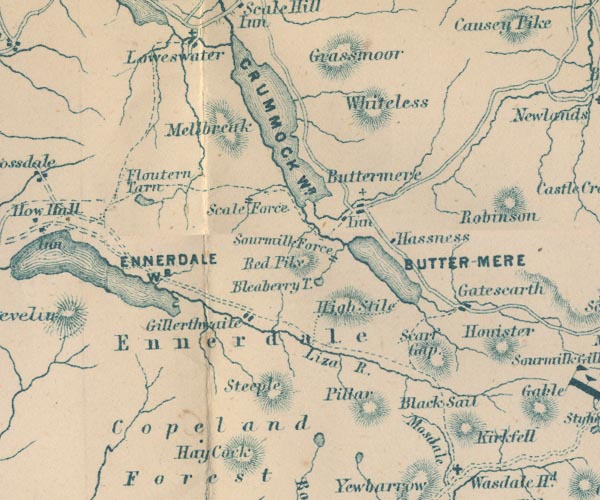
GAR2NY11.jpg
"Inn"
block, building
item:- JandMN : 82.1
Image © see bottom of page
placename:- Fish Hotel
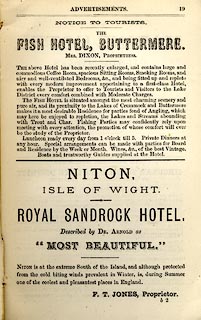 click to enlarge
click to enlargeJK1213.jpg
Adverts p.19 at the back of Jenkinson's Smaller Practical Guide to Carlisle, Gilsland, Roman Wall and Neighbourhood.
item:- Armitt Library : A1717.14
Image © see bottom of page
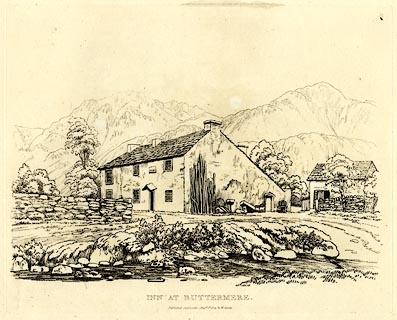 click to enlarge
click to enlargeGN0334.jpg
Plate 34 in Seventy Eight Studies from Nature.
printed in introductory pages to set of prints:- "Number 34. This is the place where Mary Robinson (sometimes called the beauty of Buttermere) for some years made a considerable advantage of public curiosity. She was a fine girl when fourteen, and a most interesting one at sixteen; what she was between that age and twenty-four is not known to the writer; but at the latter period many were disappointed, and Mary must certainly have been distressed, when the undiscerning were eager to be informed from herself, when modestly waiting upon them, how they might procure a sight of the beauty."
printed at bottom:- "INN AT BUTTERMERE. / Published Ambleside, Augst. 1st. 1809, by W. Green."
item:- Armitt Library : A6637.34
Image © see bottom of page
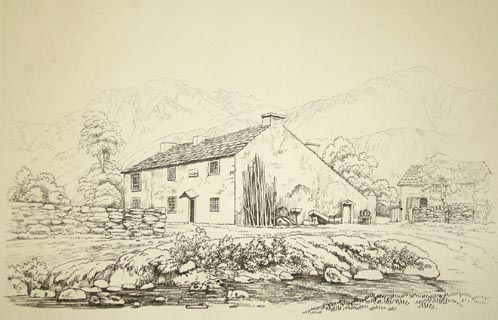 click to enlarge
click to enlargePR1273.jpg
Summertime; a small stone inn enclosed by a drystone wall stands beside a stream; it has barrels and wooden struts (?) piled against it. Beyond rise barren fells.
printed at bottom centre:- "INN AT BUTTERMERE. Published Ambleside. Augst 1st 1809 by W. Green."
item:- Tullie House Museum : 1978.108.92.12
Image © Tullie House Museum
